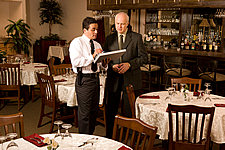|
|
|
|
|
Restaurant Sanitation: Defining Pest Management Partnership Roles for Pest PreventionBy Patrick Copps The foundation for any successful restaurant is partnership. Your kitchen staff relies on the wait staff to take orders accurately, and vice versa, your waiters depend on the cooks to provide delicious meals for customers to enjoy. The same is true of pest management. Protecting your restaurant from pests with a strong partnership between your pest management provider and your staff helps ensure happy diners and returning guests. The first step to creating a successful partnership is to define everyone's roles. While a pest management program can run smoothly, it's helpful to start off with an understanding of who's responsible for each aspect of the program.
Pest Management Provider Roles

Restaurant Roles
After all the roles of a successful pest management program are outlined, you can begin to educate your staff on how to prevent pest concerns from impacting your business. 1. Get on Board with Integrated Pest Management (IPM) Educate employees on the importance of IPM in foodservice environments. IPM programs look to prevent pests before they become a problem in your restaurant by using best practices like reporting suspected pest activity, maintaining an effective sanitation program, and keeping you facility well maintained. By using these measures first, you can manage pests with fewer chemical treatments.
Sanitation plays a major role in eliminating pests' survival needs. Critters will seek food, water and shelter in your restaurant if given the opportunity. You and your staff need to be diligent about cleaning so "no crumb is left behind". Places such as kitchens, storage areas, wait stations, dining areas and bathrooms are pest "hot spots" where you should focus your cleaning regimen each night before closing. 3. Use Preventive Storage Practices Use plastic bins not cardboard cartons to store produce, canned goods and single service items. Rodents and crawling insects can use the cardboard as harborage and may go unnoticed until the box is opened or emptied. Keep all stored goods on stainless steel racks, with at least a 6" clearance between the floor and the lowest shelf. 4. Make Sure to Monitor It's tough for you to be in more than one place at once, which is why your staff are there to be the eyes and ears of your restaurant. Many times pests will stay out of sight, making problems tough to spot, but they'll likely leave behind signs of their presence, which can be an indicator that unwanted guests may be present. Ask your staff to look out for any gnaw marks, droppings and live or dead pests in stockrooms and on incoming shipments.
Rest assured that with clearly defined roles and an engaged team of employees, pests will look for a meal elsewhere.
Patrick Copps is Technical Services Manager for Orkin's Pacific Division. A Board Certified Entomologist in urban and industrial entomology, Mr. Copps has more than 35 years experience in the industry. For more information, email Mr. Copps at pcopps@rollins.com or visit www.orkincommercial.com. |
|